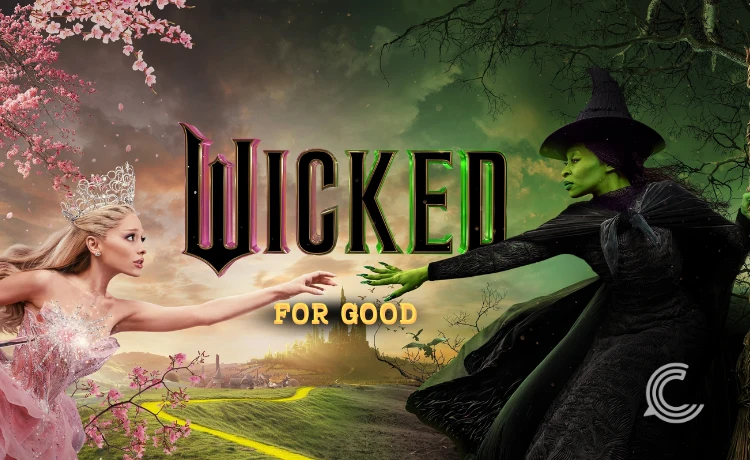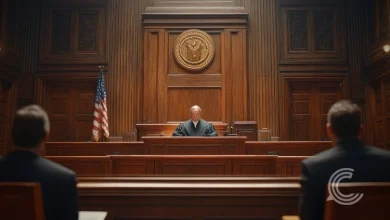Wicked: For Good Review on Glinda and How Popularity Becomes Prop

Key Points:
- Glinda’s journey takes center stage, exploring the moral and emotional compromises required to maintain her public image as “Glinda the Good”
- The film successfully translates the musical’s darker second act, focusing on political propaganda and the systemic oppression of the Animals of Oz
- Cynthia Erivo and Ariana Grande deliver spectacular, emotionally resonant performances, cementing their roles as the definitive Elphaba and Glinda for a new generation
The cinematic conclusion of the long-awaited two-part adaptation, Wicked: For Good, finally draws the curtain on the story of Elphaba and Glinda, the legendary witches of Oz. While the film delivers on the spectacular scale and the powerhouse vocals established in the first installment, its unique strength, and perhaps its most compelling dramatic angle, lies in the fraught, internal conflict of Glinda.
The movie, directed by Jon M. Chu, shifts the narrative focus from Elphaba’s (Cynthia Erivo) outward fight against tyranny to Glinda’s journey(Ariana Grande) as she grapples with the high cost of her fabricated “goodness” and widespread popularity.
The Allure of the Artifice
Wicked: For Good immediately plunges the audience into a darker, more politically charged Oz. Elphaba, now the demonized “Wicked Witch of the West,” lives in exile, fighting the Wizard’s (Jeff Goldblum) authoritarian regime and the enslavement of the Animal population. Meanwhile, Glinda has ascended to the pinnacle of Ozian fame, manipulated by the cunning Madame Morrible (Michelle Yeoh) to become the perfect, pink-hued symbol of “Goodness.”
This is where the film finds its unique cinematic potency. The movie expertly frames Glinda’s public life as a meticulously curated performance. She is trapped in a glamorous prison of her own making, realizing that her coveted fame comes with a moral obligation to endorse the very propaganda that slanders her true friend. Her arc becomes a poignant exploration of celebrity culture, where the manufactured image is prioritized over personal truth and integrity.
Erivo and Grande: Two Halves of a Whole
The success of this darker turn rests entirely on the shoulders of the two leads. Cynthia Erivo, as Elphaba, continues to be a force of nature, especially in her performance of the iconic “No Good Deed,” which pulses with raw, justifiable fury. Erivo grounds the fantastical rebellion in genuine heartbreak and fierce determination.
However, Ariana Grande’s portrayal of Glinda truly shines in this second act. She sheds some of the character’s earlier effervescence to reveal the deep-seated vulnerability and internal conflict beneath the satin-slippered facade. Her performance successfully translates the pain of a woman who has achieved her dream but at the expense of her soul. Glinda’s battle is not against the Wizard, but against the reflection of the “good” girl the world insists she must be. Screen Rant notes that their friendship remains the “emotional current” that makes the film’s pull irresistible.
Pacing and the Political Allegory
Director Jon M. Chu maintains the lush, expansive visual style of the first part, presenting the Emerald City and Elphaba’s Kiamo Ko castle with breathtaking detail. Yet, the film struggles slightly with pacing, a common criticism of the stage musical’s second act. Some of the narrative threads, including the rapid-fire introduction of familiar Wizard of Oz elements like the Scarecrow and Tin Man, feel rushed, even while the overall runtime is lengthy.
Despite these minor stumbles, the Glinda’s journey contextualizes the heavier themes of political manipulation and xenophobia. The Wizard, masterfully played by Jeff Goldblum, is presented not as a mystical figure but as a self-serving, narcissistic politician whose power is built on lies and showmanship. Madame Morrible functions as his “Press Secretary,” carefully orchestrating the smear campaign against Elphaba and the oppression of the Animals. This anti-fascist subtext remains a powerful, relevant element, and notes the film’s attempt at subtle commentary on fascist rulers, manipulative bureaucracy, and how people are persecuted for being different. The continuing relevance of these wicked political themes makes the film a compelling watch despite its fantastical setting.
The Power of “For Good”
The movie culminates in the title song, “For Good,” a moment of profound, tearful catharsis that reaffirms the central message: true connection changes you for good. This final exchange between Elphaba and Glinda is the emotional peak, confirming that regardless of their conflicting paths, their friendship is the defining relationship of their lives.
Wicked: For Good is ultimately a powerful, albeit occasionally uneven, finale. It not only completes the origin story of the Wicked Witch of the West but more importantly, it delivers a nuanced character study of Glinda, making a compelling case that her struggle, the difficult choice between comfort in artifice and the discomfort of truth, is the most deeply human part of the tale. The film is a box office triumph, reported by Boxoffice Proto have secured a massive global debut, proving that the magic of Oz, and the complexity of Glinda’s journey, still holds tremendous sway over audiences.



